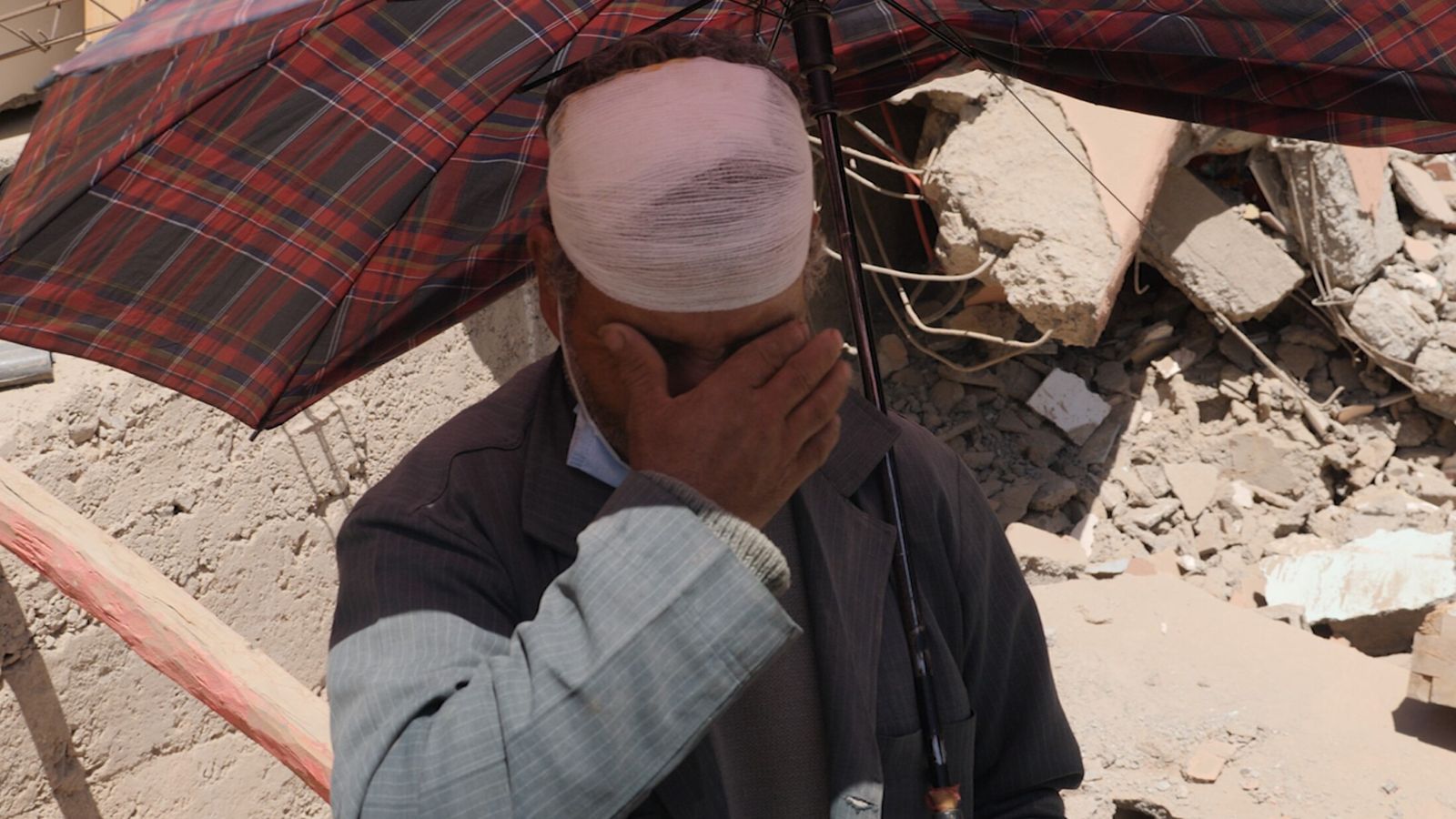Up here, in a remote mountain village, a scene of unbearable pain.
A man with sunken, exhausted eyes, walks through the rubble and destruction following the earthquake in Morocco, cradling his small dead son, wrapped in a red blanket.
He walks towards an area of wasteland just to the side of the road, which is already full of freshly dug mounds and rudimentary markers.
A grave is being dug for the boy. It is not quite finished. He waits, holding his child.
CCTV shows moment earthquake struck – latest updates
The man passes the body to someone else – a friend, maybe a relative. They are all men. And then the man with the spade indicates he is finished digging.
The body is lowered in and then, with barely a moment for reflection, the grave is refilled with the baked earth and stones that had been dug out moments earlier.
There is no ceremony. There is no time.
The group realise they have no way to mark the grave, and so the father walks over to the destruction all around and takes a broken piece of breeze block.
He lays it down on top, then walks away. Moments after burying his son, he walks to the village and joins a group of volunteers, digging through the rubble.
This pitiful scene is almost the first thing we see when we arrive at Imi N’Tala, a village that is hard to reach and impossible to forget.
You have to drive along a winding mountain track to get here, and then walk along roads that turn into paths, and then into long stretches of rubble.
We meet Ibrahim, who lived near the start of the village. He tells us he was at home watching television when he felt a vibration, then heard the noise getting louder and then heard a boom that sounded like an explosion. He’s in tears, but wants to carry on talking.
He says he survived because he jumped out of a window in his living room. The power went out, and the village was plunged into total darkness. He heard screams but couldn’t make his torch work. It took Ibrahim three hours to find a battery, which he pulls from his pocket.
“I tried to help, I tried to do something,” Ibrahim says. “But I couldn’t. It was impossible.”
He estimates that 70 of his friends in the village are dead, along with his stepmother. As he finishes talking, he leans forward and hugs me as hard as he can. It is a long, desperate embrace.
‘There is always hope’
As we walk further, the devastation gets even worse.
British search and rescue workers, who arrived in the early hours, have come here to do whatever they can, bringing specialist equipment, many decades of experience and four dogs who are trained to find people who are still alive. So far, the dogs have detected no signs of life.
“There is always hope,” says Jim Chaston, who is leading the team here. He has been working in natural disasters for more than 20 years.
“We have to be a bit detached to do our jobs,” he tells me. “But of course, we shed a tear when we have to tell people bad news. We have to be strong because that’s what these people expect of us.”
His team goes further down the path, now so strewn with rocks that it feels like we’re clambering rather than walking. The site that greets us is horrendous – a great slice of the mountain cliff has been shaken free and has simply slid into the village, obliterating everything in its path.
There’s nothing left here. The people, homes, the road, everything – it’s all been destroyed. Rescue teams are looking for survivors but with little expectation. This feels much more like a recovery operation than a rescue.
At least they have support. On the other side of the valley, we can see people waving at us, shouting. They have been cut off – roads blocked and no aid getting through. And they, of course, are dealing with their own desperate problems.
Read more:
Hope fades in town where stench of bodies is ‘overpowering’
Race against time to reach trapped quake survivors
By contrast, there are hundreds of people in Imi N’Tala – volunteers delivering aid, rescue workers, relatives and some survivors. The place fizzes with noise and energy – some people determined to help; others wailing in grief. Some doing both.
And then there are those who simply wander, overwhelmed, terrified and bewildered. Who knows how any of us would respond when confronted by such horror?
Because Imi N’Tala is a village haunted by sudden, awful change – the homes that have gone, the lives that have been wrecked and the people who have disappeared under the rubble. It is a village that has been torn apart.






